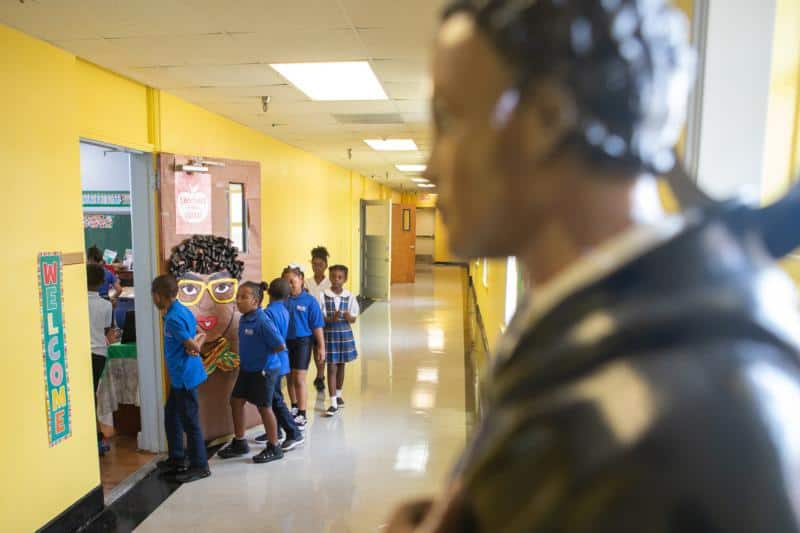
U.S. are busy trying to avert fiscal calamity by turning to government emergency support, online appeals and campus virtual tours to prop up next year’s enrollment.
The emerging scale of the COVID-19 health crisis and its widespread economic fallout has hit the education sector hard and fast, leaving private and Catholic schools scrambling to first look toward an array of government-affiliated pandemic relief vehicles, including as the Small Business Administration’s Paycheck Protection Plan and the federal CARES Act legislation.
The New Jersey-based Healey Education Foundation, which helped guide a Catholic school foundation in Camden, New Jersey through some of the early COVID-19 relief funding applications, advised its clients that “quick action trumps complete understanding” in a crisis situation.
“We move to an ‘ask questions later’ mode when time is of the essence,” Christine Healey, president and board chair of Catholic Partnership Schools in Camden, wrote in an April blog post on Healey Foundation’s website.
Healey helped a Catholic education foundation in Camden apply for funding within a week after the CARES Act was signed into law.
At the grassroots level, individual schools and dioceses have been rolling COVID-19 tuition relief funds or similar online giving appeals — many in place of annual bricks and mortar gala events and silent auction fundraisers, which had to be canceled due to social distancing mandates.
In some places, where school finances and enrollment were already fragile, relief didn’t arrive fast enough as the COVID-19 crisis hastened the closing of two Catholic schools in the Diocese of Harrisburg, Pennsylvania, in April.
Kathy Mears, interim director of the National Catholic Educational Association, which had to shift its annual conference to an online Zoom event in April, said school budgets everywhere have been profoundly impacted by church closures.
“Many of our schools still depend on parish subsidies and those schools are struggling because no one is going to Mass right now,” Mears said, pointing to a recent online fundraiser in the Archdiocese of Boston which raised some $300,000 as well as similar efforts including GoFundMe and Giving Tuesday virtual appeals around the U.S.
“If we can get people in the building for a face to face tour with a student leading the tour, it is hard to say no to Catholic education,” Mears said, adding that since schools can’t have do these personal tours and meetings now they are exploring all alternatives such as virtual school tours.
Meanwhile, an estimated 35 percent of Catholic schools have received a Payroll Protection Plan or similar funding, and many schools voluntarily kept even their hourly wage employees on the payroll through Easter, according to Mears.
That kind of gesture, she said, has not gone unnoticed within school communities.
“We have many stories of parents saying I can’t pay right now, but when I get my job back, I will make it up. They aren’t necessarily pulling their children out of school but are asking for more time,” Mears added.
Mary Pat Donoghue, executive director of the Secretariat of Catholic Education for the USCCB and a past principal of St. Jerome Academy in Hyattsville, Maryland, said experiences learned during the 2007-2008 recession can serve educators well now.
“We have a good number of schools facing a crisis because of COVID-19,” Donoghue said. “Some of the things that worked very well when I headed up a school in crisis included strong communication between the school and community and the ability to articulate a compelling vision for why we need Catholic schools.”
She praised Catholic schools for moving quickly — often within seven days — to transition from on-campus learning to distance learning, demonstrating a high degree of flexibility and nimble maneuvering.
“Now is a time for Catholic schools to pull together all their local stakeholders and the school community to look for local solutions to sustaining Catholic schools through the ongoing crisis,” she said.
In the meantime, Donoghue suggested schools continue their event calendar with virtual programming to fill the void left by social distancing lockdowns and to keep in mind the all-important task of pushing forward with enrollment for next year.
“I had a colleague who used to say that the ultimate fundraiser is tuition, so being able to continue your enrollment is important. I am very excited by the virtual tours, by the outreach that schools are making to both current and prospective families — that will have the biggest impact in the long run,” Donoghue said.
Kitty Quinn, assistant superintendent of elementary schools for the Diocese of Columbus, Ohio, said after the COVID-19 crisis hit, the diocese made a commitment to make sure Catholic school staff salaries were upheld.
A member of the diocesan school’s office was assigned to work directly with the diocesan development office and a free-standing Catholic schools foundation in support of special fundraising drives and direct outreach for schools.
“We are a state that has an Educational Choice Opportunity Scholarship and we have been working hard not only with our legislators but with the Catholic Conference of Ohio to make sure those pieces stay in place next year,” she said. “That is in addition to our parishes also applying for the federal loans.”
In Tallahassee, Florida, Mary Camp, associate director for accreditation for the Florida Catholic Conference, is busy tracking the government relief funding options that Catholic schools and other private schools in Florida hope to access.
Many private schools in the state successfully helped their staff and families navigate the paycheck protection and small-business loan programs.
“Schools that have relationships with their local small banks have been able to get through the process successfully and actually get something,” Camp said.
“We are also looking at ways to get funds directly to our families so that they can continue to choose the best fit for their kids’ education,” she added, noting that the 2008 recession led to some Catholic schools becoming charter schools and others suffered reduced enrollment.









